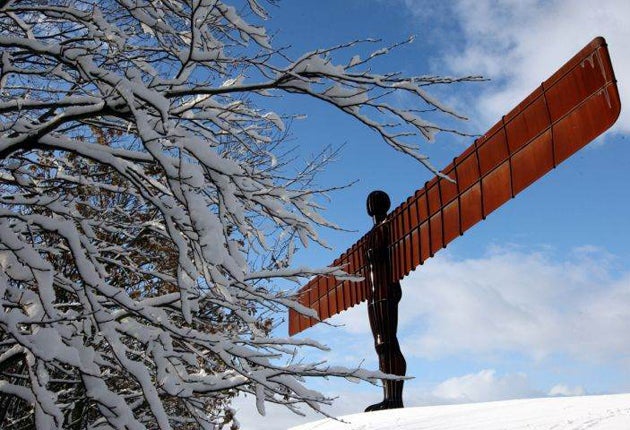Forget the cold – the world is warmer, says Met Office
Amid the most widespread November snow in 17 years, scientists warn that temperature records provide climate change evidence

Despite a snowy November and last winter being the coldest for more than 30 years, evidence for a warming planet caused by human actions has grown even stronger in the last year, the Met Office said yesterday.
There is "overwhelming" evidence of warming in a wide range or climate indicators, not just surface temperature, Met Office scientists said, although the rate of warming in the last 10 years has slowed compared to the rate over previous decades. The Met Office released its new report as motorists battled with hazardous conditions on many roads yesterday, especially in northern and eastern Britain, as the most widespread November snowfall for 17 years gripped the country. There were falls of 15cm (6ins) in Aberdeenshire, 12cm in the Scottish Borders and 10cm in Durham, and the freezing conditions are likely to spread south and west and last over the weekend, with the weather in general "turning increasingly wintry".
The icy conditions highlighted the Met Office's explanation yesterday of why the rate of climate change seems to have slowed, a phenomenon sometimes seized on by climate sceptics as evidence that man-made global warming is overstated or not happening.
It can be explained by the natural variability of the climate, Met Office researchers said, while other factors causing it may include a decrease in solar activity, and the increase in atmospheric aerosols – fine particles of substances such as sulphur, emitted from power stations, which reflect back the sunlight and so cool the planet. Aerosols have risen because of growing industrialisation in Asia.
Since the 1970s, the long-term rate of global warming has been around 0.16C per decade, but that has slowed in the last 10 years to between 0.05C and 0.13C, depending on which of the three major temperature record series are used.
But, according to the latest data, the decade since the millennium was clearly the hottest on record, and after being more or less on a plateau during the decade, the warming trend is now resuming its upward path, with 2010 likely to prove either the world's hottest or second-hottest year on record.
British figures, produced by the Met Office Hadley Centre in association with the Climatic Research Unit of the University of East Anglia, are indicating that this year will probably be the second hottest, but figures produced by Nasa in the US show it may break all records. A definitive statement will be made next week by the World Meteorological Organisation at the UN Climate Conference in Cancun, Mexico, which begins on Monday. Asked how a shivering pensioner could look at the present icy weather and remember the freeze of last winter, yet be convinced that the world was warming, Dr Vicky Pope, the Hadley Centre's head of climate science advice, said yesterday: "What's happening here now and what happened here last winter are a vivid illustration of natural climate variability. To understand global warming we have to look at the global picture."
While last winter in the UK was very cold, many other parts of the world were unnaturally warm at the same time, she said. "And we are starting to see a trend of fewer cold winters and more heatwaves in Britain, which we can link to global warming." Dr Pope added that new analysis of the data indicated the warming trend of recent years has been underestimated.
Ice warning on roads
The AA said it had attended more than 11,000 breakdowns and expected to be called out to 14,000 by the end of the day – a 50 per cent increase on normal call-outs. Paul Leather, the AA's patrol of the year, said: "Our concern is black ice. If possible, people should stick to the gritted main roads and keep their speed down. In case of any problems, at the very least, carry plenty of warm clothing and a fully charged mobile phone."
The AA said the worst-hit areas were Aberdeen, Newcastle, Middlesbrough, Manchester, Birmingham, Leeds and North Yorkshire where breakdowns went up by 60 per cent to 70 per cent. The A170 at Sutton Bank was badly affected by snow, as was the B1249 at Staxton Bank near Scarborough.
A spokesman for North Yorkshire County Council said six village primary schools had been forced to close due to the snow. Aberdeenshire Council said 121 schools in the area were closed or partially closed because of snow.
Police said all roads in the Grampian region had snow and ice, and those closed included the A93 at Glenshee, the A939 to Ballater, and the A957 Crathes to Stonehaven at the Slug Road.
Subscribe to Independent Premium to bookmark this article
Want to bookmark your favourite articles and stories to read or reference later? Start your Independent Premium subscription today.

Join our commenting forum
Join thought-provoking conversations, follow other Independent readers and see their replies